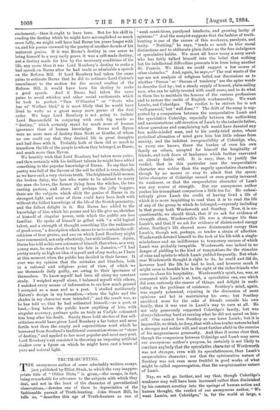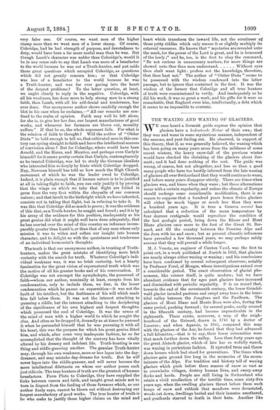TRUTH-HUNTING.
THE anonymous author of some admirably-written essays, just published by Elliot Stock, to which the very inappro- priate title of " Obiter Dicta" is given,—the essays, in fact, being remarkable for relevance to the subjects with which they deal, and not in the least of the character of parenthetical observations,—devotes one of them to depreciation of the fashionable pursuit of Truth-hunting. John Stuart Mill, he tells us, "describes this age of Truth-hunters as one of weak convictions, paralysed intellects, and growing laxity of opinions.'" And the essayist suggests that the fashion of truth- hunting is one of the causes of this weakness, paralysis, and laxity. "Nothing," he says, "tends so much to blur moral distinctions and to obliterate plain duties as the free indulgence of speculative habits. We must all know many a sorry scrub who has fairly talked himself into the belief that nothing but his intellectual difficulties prevents him from being another St. Francis. We think we could suggest a few scores of other obstacles." And, again, he says,—" The real wants of the age are not analysis of religious belief, nor discussions as to whether 'Person' or Stream of tendency' are the apter words to describe God by ; but a steady supply of honest, plain-sailing men, who can be safely trusted with small sums, and to do what in them lies to maintain the honour of the various professions and to restore the credit of English workmanship. We want Lambs, not Coleridges. The verdict to be striven for is not well-guessed,' but well-done.'" The drift of the essay is sup- ported by a comparison between the unspeculative Lamb and the speculative Coleridge, especially between the unflinching and unostentatious self-devotion of Lamb to the imbecile father, whose querulous and complaining talk would have daunted any less noble-minded man, and to his sorely-tried sister, whose periodical alienation of mind gave him but little release from anxiety, and the indolent irresponsibility of Coleridge, who, as every one knows, threw the burden of even his own family on others, accepted for himself the hospitality of friends, and took doses of laudanum which further enervated an already feeble will. It is easy, then, to justify the verdict, that in this particular case the unspeculative character was nobler than the eagerly speculative character ; though by no means so easy to admit that the specu- lative character of Coleridge caused or even greatly increased its weakness, or that the unspeculative character of Lamb was any source of strength. But our anonymous author pushes his triumphant comparison a little too far. He unhesi- tatingly gives Lamb the credit of having lived a life of which it is more inspiriting to read than it is to read the life of any of the group to which he belonged,—expressly including in that group both Wordsworth and Southey. Now, it is un- questionable, we should think, that if we ask for evidence of strength alone, Wordsworth's life was a stronger life than Lamb's, and that if we ask for evidence of disinterested energy alone, Southey's life showed more disinterested energy than Lamb's, though not, perhaps, so tender a strain of affection. Wordsworth devoted himself to the task of his life with a single- mindedness and an indifference to temporary success of which Lamb was probably incapable. Wordsworth was indeed in no danger of yielding to the kind of temptations for the stimulus of wine and spirits to which Lamb yielded frequently. But what- ever Wordsworth thought it right to do, he could and did do, however hard the life he had to lead, and however much it might seem to humble him in the sight of the richer friends who came to share his hospitality. Wordsworth's spirit, too, was, as compared with Lamb's at least, a speculative one, one which did scan curiously the causes of things, and delight in medi- tating on the problems of existence. Southey's mind, again, was eagerly polemical, rejoicing in the discussion of mere opinions and hot in maintaining his own ; but Southey sacrificed more for the sake of friends outside his own family, than it was ever in Lamb's way to earn at all. He not only generously supported Coleridge's family, but was always labouring hard at earning what he did not spend on him- self. One cannot love Southey as one loves Lamb ; but it is impossible, we think, to deny, that with a less tender nature he had a stronger and nobler will, and went further afield in the exercise of his magnanimous generosity. And thus it seems clear that, though the comparison between Coleridge and Lamb may serve our anonymous author's purpose, he certainly is not likely to convince anybody that the speculative character of Wordsworth was not stronger, even with its speculativeness, than Lamb's unspeculative character; nor that the opinionative nature of Southey was not even more fruitful in good works of what might be called supererogation, than the unopinionative nature of Lamb.
Nay, we will go farther, and say that, though Coleridge's weakness may well have been increased rather than diminished by his constant scrutiny into the springs of human action and human thought, the verdict of our anonymous author, "We want Lambs, not Coleridges," is, for the world at large, a
very false one. Of course, we want men of the higher stamp more than we want men of a lower stamp. Of course, Coleridge, had he had strength of purpose, and devotedness to duty, would have been a far more useful man than he was. But though Lamb's character was nobler than Coleridge's, would it be in any sense safe to say that Lamb was more of a benefactor to the world because he was not a Truth-hunter, and put aside those great questions which occupied Coleridge, as questions which did not greatly concern him ; or that Coleridge was less of a benefactor to the world because he was a Truth-hunter, and was for ever gazing into the heart of the deepest problems ? To the latter question, at least, we ought clearly to reply in the negative. Coleridge, with all his weakness, has done more to help strong men to a strong faith, than Lamb, with all his self-denial and tenderness, has ever done. Our anonymous author shows candidly enough the blot in his case when he exclaims,—" All our remarks are con- fined to the realm of opinion. Faith may well be left alone, for she is, to give her her due, our largest manufacturer of good works, and whenever her furnaces are blown out, morality suffers." If that be so, the whole argument fails. For what is the relation of faith to thought ? Will the author of " Obiter Dicta" be bold enough to tell us, that cultivated men in this cen- tury can spring straight to faith and leave the intellectual sources of conviction alone ? But for Coleridge, where would have been Arnold, and the Hares, and Maurice, and perhaps even Carlyle himself? for it seems pretty certain that Carlyle, contemptuously as he treated Coleridge, was led to study the German idealists who interested him so deeply by hints which Coleridge dropped. Nay, Newman himself has told us how much the High Church movement of which he was the leader owed to Coleridge. Indeed, it is plain enough that if human nature is to be justified at all in taking flight to faith, you can only justify it by proving that the wings on which we take that flight are folded in germ from the very first within the chrysalis of our common nature ; and that insult to the birthright which we have inherited, consists not in taking that flight, but in refusing to take it. It was this that Coleridge did so much to prove ; it was the evidence of this that, as a Truth-hunter, he sought and found ; and it is by his array of the evidence for this position, inadequately as his great genius did what it might well have done adequately, that he has exerted over the mind of this country an influence incom- parably greater than Lamb's, or than that of any man whose only mission it was to widen and soften our insight into human character, and to delight us with the quaintness and tenderness of an individual humourist's thoughts.
The truth is that our anonymous author, in treating of Truth- hunters, makes the great mistake of identifying mere brisk curiosity with the search for truth. Whatever Coleridge's indi- vidual weakness was, it was no brisk cariosity, but a hearty fascination for the great vision of supernatural truth which was the motive of all his greater books and of his conversation. If Coleridge was not amongst the nympholepts, the possessed of faith—whom our author, nominally at least, excepts from his -condemnation, only to include them, we fear, in the lesser condemnation which he passes on superstition—it was not the fault of his intellect, but the feebleness of his will which made him fall below them. It was not the interest attaching to guessing a riddle, but the interest attaching to the deciphering -of the significance of his own highest and deepest thoughts, which possessed the soul of Coleridge. It was the nexus of the mind of man with a higher world to which he sought the -clue. And often as he dropped it, dreamily as at times he pursued it when he persuaded himself that he was pursuing it with all his heart, this was the purpose for which his great genius fitted him, and which, after some very inadequate fashion, he so far accomplished that the thought of the century has been vitally altered by his dreamy and indolent life. Truth-hunting is one thing and riddle-guessing another. The genuine Truth-hunter may, through his own weakness, more or less lapse into the day- dreamer, and may mistake day-dreams for truth. But he will never lapse into the riddle-guesser, and will never become the mere intellectual dilettante on whom our author pours such just ridicule. The true hunters of truth are the greatest of human benefactors. From Plato to Coleridge, they have supplied the links between reason and faith, and taught great minds not to turn in disgust from the feeding of those furnaces which, as our author finely says, cannot be blown out without destroying our iargest manufactory of good works. The true hunter of truth is he who seeks to justify those higher claims on the mind and heart which transform the inward life, not the scrutineer of those petty riddles which only amuse it or slightly multiply its external resources. He knows that" mysteries are revealed unto the meek, for the power of the Lord is great, and he is honoured of the lowly ;" and he, too, is the first to obey the command, "Be not curious in unnecessary matters, for more things are showed unto thee than men understand Without eyes thou shalt want light : profess not the knowledge, therefore, that thou hart not." The author of " Obiter Dicta" seems to be possessed with the wisdom condensed into the latter passage, but to ignore that contained in the first. It was the wisdom of the former that Coleridge and all true hunters of truth were commissioned to verify. And inadequately as he did his work, it was so great a work, and his gifts for it were so remarkable, that England owes him, intellectually, a debt which it seems to us impossible to overrate.



































 Previous page
Previous page